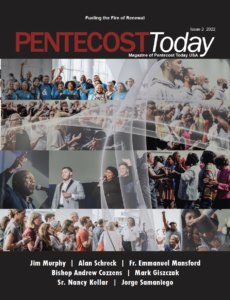Meditation and Questions for Reflection or Group Discussion
Mass Readings:
1st Reading: Isaiah 55:6-9
Responsorial: Psalm 145: 2-3, 8-9, 17-18
2nd Reading: Philippians 1:20-24, 27
Gospel: Matthew 20:1-16
Understanding God’s Justice Compared to Our Human Sense of Justice
I will give you what is just. (Matthew 20:4)
Let’s talk about justice. The landowner in Jesus’ parable promised to pay his workers what was just, but he seemed to break that promise at the end of the day. At least, that’s what the workers who were first hired thought. In their eyes, he was treating them unjustly. They saw the workers who started later get paid just as much money as the landowner had promised to them. Where’s the justice in that?
The landowner, however, had a different kind of justice in mind. For him, justice was not primarily everyone getting what he deserves, but everyone getting what he needs. Every time he came to the marketplace, he saw more men—husbands, fathers, sons, brothers—who didn’t have steady employment, but who still had to provide food and clothing and shelter to their families. How could he turn them away? How could he think only about his bottom line?
Of course, employers can’t give away all of their money; they have families to take care of too. But Jesus isn’t talking about best business practices here. He’s talking about God’s sense of justice. For God, justice is a matter of treating everyone with dignity and honor. It’s a matter of ensuring that each person is loved and cared for. It’s a matter of making sure that no one gets left behind.
What a difference from our common idea of justice! All around us, we hear that justice is about reward and retribution. If you work hard, you are rewarded with pay. If you violate a rule, you are punished until you “pay for” what you have done. While there is some truth to these statements, God’s justice goes beyond this kind of tightfisted, tit-for-tat approach. It includes generosity and love, mercy and compassion. His justice went so far as to give up his only Son to save us from sin and death.
Like the landowner in today’s parable, our heavenly Father offers us a surprising—and subversive—kind of justice. How can we help but praise him for such a gift!
“Thank you, Father, for looking after my every need.”
Download this reflection with discussion questions here.
(Many thanks to The Word Among Us for allowing us to use meditations from their monthly devotional magazine. Used with permission. For more information on how to subscribe to their devotional magazine, go to www.wau.org).
Sunday, September 24, 2017
Questions for Reflection or Discussion:
- The first reading encourages us to “seek” and “call” upon the Lord with these words: “Seek the LORD while he may be found, call him while he is near.” When we do, we are assured “he is near” and “may be found.”
- Why do you think it is important to “Seek the Lord” and to “call” upon him, especially in prayer?
- In what ways do these words in the first reading relate to our preparation before Mass and our preparation to receive Christ in the Eucharist? How could you improve your own preparation?
- These words also imply that there may also be times when we feel that the Lord is not near to us or can’t be found? Why is it especially important to seek and call upon the Lord during these times as well?
- The responsorial psalm also assures us that “The LORD is near to all who call upon him.” It goes on to describes the Lord with these words: “The LORD is gracious and merciful, slow to anger and of great kindness. The LORD is good to all and compassionate toward all his works.”
- In what way does this Old Testament description of the Lord describe the attributes of Jesus Christ revealed in the New Testament?
- How important is it to you to avail yourself of Christ’s kindness and mercy in the Sacrament of Reconciliation? What keeps you from taking advantage of God’s love and forgiveness more often in this sacrament?
- In the second reading, St. Paul states his desire that “Christ will be magnified in my body, whether by life or by death” and exhorts us to live our lives “in a way worthy of the gospel of Christ.”
- How would you describe the way St. Paul lived these words?
- How do these words apply to how you live your life as a Christian?
- What can we do individually, and together with others, to make these words a greater reality in our lives?
- The Gospel reading begins with these words: “The kingdom of heaven is like a landowner who went out at dawn to hire laborers for his vineyard. After agreeing with them for the usual daily wage, he sent them into his vineyard. Going out about nine o’clock, the landowner saw others standing idle in the marketplace, and he said to them, ‘You too go into my vineyard, and I will give you what is just.’ ” The landowner repeated this around three o’clock and five o’clock. In the evening the landowner gave each laborer the same wage, which caused the initial laborers to complain to the landowner. He then responds to one of them with these words: “My friend, I am not cheating you. Did you not agree with me for the usual daily wage? Take what is yours and go. What if I wish to give this last one the same as you? Or am I not free to do as I wish with my own money?”
- What message do you think Jesus was trying to convey with the landowner’s final words to the laborers?
- If you were one of the first laborers in the vineyard, you would have reacted as they did? Why or why not?
- Pope John Paul II once said that this parable was addressed not just to the apostles but also “to all who desire to be authentic disciples of the Lord.”
- In what ways can you become a more active laborer and disciple in the Lord’s vineyard?
- What about your parish? Are there some new steps you can take to take to be more active?
- The meditation, reflecting on Jesus’ parable in the Gospel reading, opens with these words: “Let’s talk about justice. The landowner in Jesus’ parable promised to pay his workers what was just, but he seemed to break that promise at the end of the day. At least, that’s what the workers who were first hired thought. In their eyes, he was treating them unjustly. They saw the workers who started later get paid just as much money as the landowner had promised to them. Where’s the justice in that?”
- In what ways does Jesus turns our sense of justice and generosity on its head with the ending words of the parable: “Are you envious because I am generous? Thus, the last will be first, and the first will be last.”?
- Does your own human sense of justice and generosity sometimes keep you from seeing the love and mercy of God toward you, and in the lives of others? Why? In what specific ways do you need to change in order to have more of God’s heart of mercy and forgiveness toward others?
- Take some time now to pray and thank the Lord for his justice and mercy in meeting your needs and the needs of all your loved ones. Use the prayer at the end of the meditation as the starting point.
“Thank you, Father, for looking after my every need.”
[The discussion questions were created by Maurice Blumberg, who is in partner relations for The Word Among Us Partners, (http://www.waupartners.org/); a ministry of The Word Among Us (www.wau.org) to the military, prisoners, women with crisis pregnancies or who have had abortions, and college students. He is also a member of the National Service Committee Council of the Catholic Charismatic Renewal (https://www.nsc-chariscenter.org/) and a member of the board of directors of the Christlife Catholic Ministry for Evangelization (https://christlife.org/). Maurice was also the founding Executive Director of the National Fellowship of Catholic Men. He can be contacted at (Enable Javascript to see the email address) mblumberg@wau.org or mblumberg@aol.com.]


 Click Here for us to pray for your intentions through our new website.
Click Here for us to pray for your intentions through our new website. 
